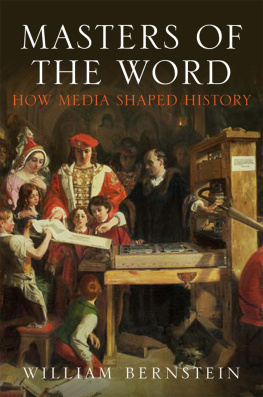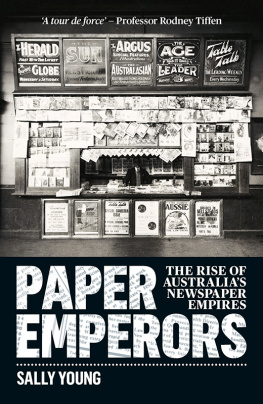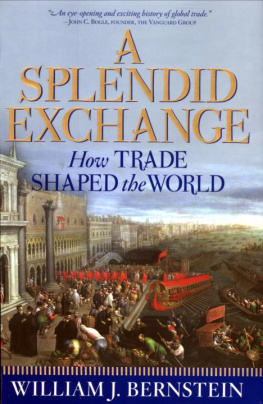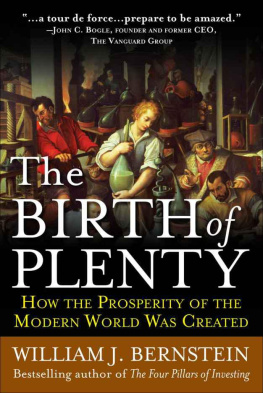MASTERS OF THE WORD
Also by William J. Bernstein
The Intelligent Asset Allocator
The Four Pillars of Investing
The Birth of Plenty
A Splendid Exchange
The Investors Manifesto

First published in the United States in 2013 by Grove Press an imprint of Grove/Atlantic, Inc.
First published in Great Britain in 2013 by Atlantic Books, an imprint of Atlantic Books Ltd.
Copyright William J. Bernstein, 2013
The moral right of William J. Bernstein to be identified as the author of this work has been asserted by him in accordance with the Copyright, Designs and Patents Act of 1988.
All rights reserved. No part of this publication may be reproduced, stored in a retrieval system, or transmitted in any form or by any means, electronic, mechanical, photocopying, recording, or otherwise, without the prior permission of both the copyright owner and the above publisher of this book.
10 9 8 7 6 5 4 3 2 1
A CIP catalogue record for this book is available from the British Library.
Hardback ISBN: 9781782390008
Ebook ISBN: 9781782390022
Export/Airside Trade Paperback ISBN: 9781782390015
Trade Paperback ISBN: 9781782390039
Printed in Great Britain.
Atlantic Books
An Imprint of Atlantic Books Ltd
Ormond House
2627 Boswell Street
London
WC1N 3JZ
www.atlantic-books.co.uk
To Jane
I NTRODUCTION
The morning, like all mornings, began poorly for Winston Smith. Awakened by the screeching alarm of the omnipresent telescreen, Winston, the hero of George Orwells Nineteen Eighty-Four, hurled his cold, naked, arthritic body out of bed for the mandatory calisthenics. Thirty to forty group! Thirty to forty group! Take your places, please. Thirties to forties! screamed the personal trainer from hell.
Winstonor, more accurately, 6079 Smith Wstruggled gamely against his infirmities, but his efforts did not satisfy his tormentor, whose exhortations to bend lower yielded only waves of searing spinal pain.
From the moment of the books appearance in 1948, both casual readers and critics argued about its meaning. Was it a specific indictment of socialism, as conservative readers supposed? Or was it a more generalized warning about the totalitarian tendencies inherent not only in communism and fascism, but also in liberal democracies? (Orwell eventually made clear that he meant the latter.)
The debate over Nineteen Eighty-Fours political meaning obscured a much larger point: by the middle of the twentieth century, advances in telecommunications had decisively tipped the balance of power between the ruler and the ruled toward the former, and the books miserable characters could not hope to escape the malevolent new electronic media technologies. Almost a decade before the books publication, Orwell wrote:
The Inquisition failed, but then the Inquisition had not the resources of the modern state. The radio, press censorship, standardized education, and the secret police have altered everything. Mass-suggestion is a science of the last twenty years, and we do not yet know how successful it will be.
Orwell certainly had in mind Hitlers fascist state and the security apparatus of Stalin, the likely model for Big Brother. Yet no state organ, before or since, has ever exceeded the relentless efficiency of the Ministerium fr Staatssicherheit of the German Democratic Republicthe feared Stasi. At its height, its ranks comprised nearly 100,000 East Germans, one of every 160 in the population.
Walter Ulbricht and Erich Honecker commanded a larger security apparatus in their small corner of the Teutonic world than Adolf Hitler had in all of greater Germany. The Stasi employed more resources, and about as many personnel, as East Germany did for health care. East Germans even coined a word that described a life permeated by listening devices and informers: flchendeckendnothing left uncovered. Three thousand operatives tapped telecommunications, a remarkable number considering the scarcity of private phone service; the wait for a new line could be twenty years, and quicker installation generally meant that the applicant had been targeted for surveillance. The Stasi could place a hidden camera in a room in any large hotel on two hours notice.
East German surveillance was not all high-tech. In a police state, the avoidance of microphones, wiretaps, and cameras becomes second nature, and the Stasi increasingly relied on older methods, particularly informers. Overall, about 2 percent of East Germans regularly snitched on their friends, neighbors, and colleagues. In many professions and locales, the Stasi penetrated even more deeply. For example, it responded to high defection rates among physicians with intense recruitment of informers; one doctor in twenty spied on his or her colleagues.
After the regime fell, citizens rummaging through Stasi facilities came across rooms filled with numbered, sealed glass jars containing bits of cloth. In time, their purpose was discovered: each specimen was impregnated with sweat, obtained from mens armpits and between the thighs of women, so dogs could track them, if necessary, at some future date.
Counting the newborn Peoples Republic of China, at the time of Nineteen Eighty-Fours publication, nearly a third of the planets population lived in Orwellian states.
Longer-run data confirm this trend. Many researchers have compiled measures of global democracy over the past two centuries, but their data tell a curious story: increasing democratic development over the course of the nineteenth century suffered a setback, characterized by a stagnation in the percent of nations considered democratic, which lasted from about 1920 to 1980, followed by a rapid upswing in the past few decades.
Even more dramatically, between 1920 and 1980the decades of the primacy of radio and televisionthe world saw a sharp upward spike in the number of nations considered despotic. (Figures I-1 and I-2 are not symmetrical, because they do not include a third category of nations: those with indeterminate governmental systems.) Note how the early- and mid-twentieth century increase in the percent of despotic states coincides with Orwells literary career; the downswing after about 1980 would certainly have surprised the author.
Obviously, correlation is not causation, but this turn of events would certainly have astounded Orwell, since the technology available to todays totalitarian state would have overwhelmed even his fertile imagination: cameras capable of reading license plates from space, Internet-based data mining technology with an analytic capacity of millions of messages per minute, and microphones able to record the sonarmans gnats fart at fifty thousand yards. Given, then, the ever-advancing nature of surveillance technology, how did the state lose the battle for control of the individual?
Simply put, in a free market economy, communications and surveillance technologies rapidly become cheaper and more accessible to andmore importantcontrolled by the general population. Any device that increases the speed and volume of communication enhances the ability of its user to influence events; and, after all, such influence is the very essence of political power. With the passage of time, the same communications technologies that empowered the state in due course empowered the individual even more; the same technologies that allowed governments
Percent of Nations Considered Democracies

Next page











